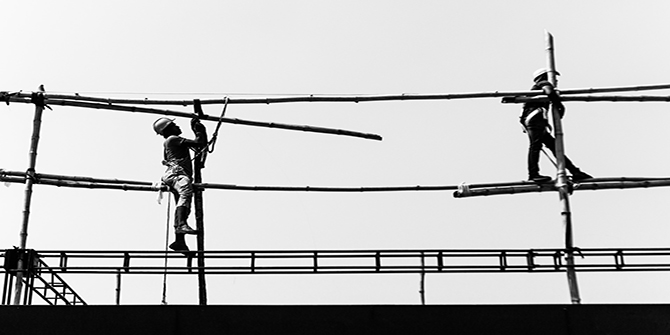 Portrayals of welfare users being lazy and work-shy, manipulating the system to receive support, are common. Drawing on research, Jenny McNeill explains the extent to which cynical manipulation is present in the conduct of welfare support recipients.
Portrayals of welfare users being lazy and work-shy, manipulating the system to receive support, are common. Drawing on research, Jenny McNeill explains the extent to which cynical manipulation is present in the conduct of welfare support recipients.
Media and government are fixated on the pervasiveness of so-called ‘scroungers’: people cheating the benefits system for welfare they are not entitled to, or those who do not properly take steps to end their dependency on benefits. In 2012, the then-Employment Minister Chris Grayling defended the use of benefit sanctions on the basis that they provide ‘a real deterrent for some people who are either not trying or who are gaming the system’.
Policy makers have also denied structural reasons in favour of emphasising people’s behaviours in explanations for the causes of poverty, unemployment, and social marginalisation. They have thus endorsed a need to ‘nudge’ targeted individuals to reduce welfare dependency. This heightened sense of panic over welfare abuse has in recent decades been called ‘scroungerphobia,’ but fears over the poor subverting the foundations of state or charitable support have much older roots (Rousseau, 1762).
In response to these long-standing caricatures of scroungers and skivers, our research shows the real hardships faced by many claiming welfare benefits. That includes people who are stigmatised, sanctioned and struggling to get by, turning to foodbanks, to other sources of support, and to ‘survival crime’. Many of the 480 welfare service users we have interviewed repeatedly over the last three years described similar devastating experiences of the process of claiming (and being denied) benefits – as depicted in Ken Loach’s film I, Daniel Blake.
In our recently published paper, we looked at the motivations and conduct of benefit claimants. We interviewed a range of stakeholders across the UK – in addition to our 480 welfare service users, there were 150 practitioners in focus groups and 52 policy stakeholders. We wanted to understand their diverse views on the extent to which they believed people were ‘gaming’ the system or were victims of it.
The qualitative data show how these ideas of ‘manipulation’ and ‘vulnerability’ are constructed, interpreted, and used by people in varied and complex ways. We argue that manipulation of welfare systems requires all of four key elements: capacity, knowledge, agency, and moral propensity. In other words, you need to be capable, rational, understand how the system works, and have a desire to manipulate the system.
Whilst some participants resisted the characterisation of manipulation, it was still reflected in people’s narratives. Welfare recipients often backed the government line on dependency culture and justified the use of welfare conditionality. At the same time, they were distancing themselves from the stigma of gaming the system which they attributed to others:
I can understand government, why they do it because there’s a lot of lazy people around. If someone’s chucking money at you just for signing your name, then people are going to do that all the time. (Woman in Family Intervention Project).
Many practitioners also believed some policy response was necessary to tackle people gaming the system, even though numbers were exaggerated. As one representative from a charity argued:
The proportion of people taking the system for a ride is small, but nonetheless you have to have controls… [but] public opinion is wrong about the extent to which people are actively trying to avoid their reciprocal obligations.
Maximising benefit entitlement was seen by some as entirely rational and legitimate. According to a charity officer:
If they’re going to be efficient about it there’s an argument that it’s not going to be entirely faithful to their experience because they will naturally – and who wouldn’t? – represent their situation as being worse than it is just to give them a bit of a cushion, because it takes so long for stuff to be sorted out.
This comment highlights three major assumptions of ‘manipulation’: firstly, that the benefit system lends itself to this kind of manipulation by incentivising people to make certain claims; secondly, that there is a general consensus that some level of manipulation is normal under the circumstances; and thirdly, that individuals are forced to act in this way when faced with a system which does not offer adequate support.
Some stakeholders argued that many welfare recipients lacked knowledge about the system, had a limited capacity to act rationally within it, and severely constrained individual ability to make choices: ‘With the group we are working with they’re not making a rational choice because they don’t actually know what the rules of the game are before they start it,’ a service provider explained.
So the question is, how can you ‘play the game’ if you don’t know the rules? While stakeholders suggested there might be some manipulation based on people’s propensity, more commonly they blamed the welfare system – its lack of flexibility and human touch – for increasing the vulnerability of many welfare claimants.
Very rarely did welfare recipients we interviewed disclose that they had knowingly manipulated the system. More often, recipients didn’t understand how the system worked, the conditions of their benefits, or why sanctions were applied. People often had multiple complex needs which made it difficult for them to understand or keep to their responsibilities and strict requirements of benefit conditions:
Look, I’m confused as hell. Help me out. No-one did; all they seemed to want to do is get someone out of the door and sanction them. (Homeless man)
There was little evidence sanctions actually changed people’s behaviour in ways the system was designed to. For vulnerable groups, sanctions worsened health, relationships, and financial stability. One charity officer argued:
When you work with people who are so vulnerable psychologically, emotionally, materially – spiritually even – and try to drive them to behaviour change with sanctioning and forcefulness, their lives are so brutal anyway that they don’t use that as a lever for change. It just feeds into despair and disengagement.
We wanted to know people’s perceptions on whether benefit recipients are abusing or being abused by the welfare benefit system. According to the stakeholders we spoke to, both things are happening to some extent. But it seems the vulnerable are more likely to bear the brunt of sanctioning. Nonetheless, the rhetoric around ‘cynical manipulation’ of welfare is undoubtedly powerful and pervasive. Will films like I, Daniel Blake help reshape public, media, and government debates around welfare?
_____
Note: the above is based on the author’s recent article in the Journal of Poverty and Social Justice, co-authored with Professor Del Roy Fletcher and Elaine Batty from Sheffield Hallam University, and Professor John Flint from the University of Sheffield. Their research is part of the project Welfare Conditionality: Sanctions, Support and Behaviour Change.
 Jenny McNeill is a researcher at the Universities of Sheffield and York.
Jenny McNeill is a researcher at the Universities of Sheffield and York.









I went to sign on. I’m an ex Construction worker due to wear and tear. I was offered a job within minutes. I had to refuse, can’t climb ladders anymore, and have days I can’t lift a cup of tea. I have you down as a Construction worker she said. Then your records are out of date as I haven’t been for nearly ten years. Without proof I will have to sanction you. The word Sanction was the commonest word in her whole speech. So I left and phoned my Doctors, two days short of a month before my appointment and there will be a charge. My Doctor did say years ago “you should get yourself on the Disabled list”, there isn’t a list for the physically Disabled anymore. There is no point going back until I have proof. Meanwhile the rent or anything else hasn’t been paid and I’m feeling like Daniel Blake and laughing at the jobless figures as I can’t believe I’m the only one who can’t sign on.
People naturally expect other to behave in the same way they would, given the same circumstances.
This is why the UKIP/tory Government thinks all social security recipients are liars, who cheat and game the system for their own amusement, and given the chance would take more than their fair share of any help.
Because that is what they do, and how they see, the public purse that they lie about, cheat the system and steal from – for their own personal gain.
It actually says more about the morals and scruples of our politicians, than the possible actions of those in need.
Absolutely right Nick.
Whilst welcoming this investigation it really misses the whole point of these personalised attacks on working people.
These allegations of ‘Lazy Workshy People’ has always been the mantra of what we now call the “feral elite”, the blame game is designed to put worker against worker whilst the real players in the game get off with the extorting huge sums of money out of the system.
We only have to look at those companies that solely make their profits out of money raised through taxation.
Anyone who saw how Donald Trump’s grandfather and father and as to how they made their money building houses out of state funding, Trumps father was brought in front of a senate committee to see how they had amassed such large Bank accounts whereas previously they were a struggling business.
The other major point missed in all of this debate is how money enters the economy and why the Bankers need poverty in order make their profits.
If people generally had plenty of disposable income, they would not need to borrow, hence the banks would not get their custom and profits would be limited.
In short, poverty is a direct policy, as Oxfam made clear in their report, there are 85 people that own £66.8 trillion between them and they could cure all the poverty in the world with a matter of billions, not even a trillion. So why don’t they?
Josiah Stamp
“Banking was conceived in iniquity and was born in sin. The bankers own the earth. Take it away from them, but leave them the power to create money, and with the flick of the pen they will create enough deposits to buy it back again. However, take away from them the power to create money and all the great fortunes like mine will disappear and they ought to disappear, for this would be a happier and better world to live in. But, if you wish to remain the slaves of bankers and pay the cost of your own slavery, let them continue to create money.” (Said to be from an informal talk at the University of Texas in the 1920s, but as yet unverified.)[